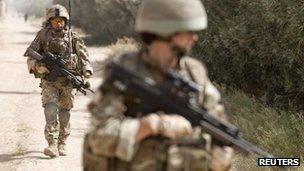Starting and finishing at first minister's questions
- Published
One is just finishing, one has just started - which perhaps explains why Iain Gray and Ruth Davidson received notably different treatment from Alex Salmond at Holyrood today.
Or perhaps it was down to the very different topics chosen by the opposition leaders - independence and serious crime.
Or perhaps Team Salmond also calculate that the satire and hard attack dished out to Mr Gray might sound a little uncomfortable in the public ear if also delivered in the direction of a young, relatively inexperienced woman.
In any event, the two sets of exchanges were substantially different by degree.
At Holyrood, there are also different interpretations being placed upon Ms Davidson's contribution in which she chided the Scottish government over an apparent delay in addressing the present situation which permits convicts to appeal the punishment part of their sentences, in effect reducing the minimum terms applied by the court.
Ms Davidson referred to cases involving horrific child sex offences.
Ministers, she asserted, had indicated in March that they were proposing to act. Yet there was nothing in the September legislative programme. Why, she asked, is it taking so long?
What would you understand from that? Would you take it that she was suggesting that nothing had been done or was being done by ministers?
Alex Salmond certainly did.
He rose and noted, in a deliberately quiet voice, that Ms Davidson was "misinformed" and that a bill to address the issue would be published by the end of the month.
Ruth Davidson then indicated she had indeed noted comments from ministers to that effect - and then changed tack or developed her point to suggest that whole life terms should be available to courts, as in England.
Again, Mr Salmond was notably modest and contained in his response, addressing the issue as if she were an inquiring colleague rather than an inquisitorial opponent.
I spoke to a number of observers afterwards. The SNP version is that Ms Davidson's questions did not appear to reflect, fully, the position - which was that, while the plans for a bill had not been fully in place by the time of the legislative statement, they had been clearly signalled since by ministers.
Mr Salmond, I was told, had quite deliberately steered clear of vilifying or lampooning his opponent - not least because the topic was so grim.
And the Conservatives? One Tory MSP described the questions as "hideously embarrassing". Another said there was a "stunned silence".
Which perhaps simply reflects the fact that Ms Davidson has yet to heal the wounds left by the leadership contest.
Team Davidson insist that she was fully aware of progress on the issue - or rather the lack of it.
They insist further that she was simply asking why there had been such a delay - and suggesting further avenues for action. No misinformation or misunderstanding.
Labour's Iain Gray pursued Mr Salmond over the independence referendum. When? What?
Colleagues and country
In good time, responded Mr Salmond, and in line with the promise delivered during the election.
The argument, of course, was much more prolonged than that - with Mr Salmond seizing upon the apparent indication from Mr Gray that he wanted a definite date and not necessarily the earliest possible date.
Not sure we should read too much into heated exchanges at question time - but I was intrigued by Mr Gray's reference to the Electoral Commission being given charge of the referendum.
The Scottish government's position is that they will establish an ad hoc Referendum Commission in Scotland.
That it would be passing strange to hand control to the Electoral Commission which, they argue, reports ultimately to the UK Government who are, again they argue, scarcely detached observers.

Mr Salmond said Scots soldiers could continue in the British Army, if independence happened
But could not a comparable charge also be levied against the proposed Scottish commission, fairly or otherwise in each case?
I would not be at all surprised if some compromise were to emerge - perhaps with a Scottish outfit operating under the overall ambit of the established Electoral Commission and perhaps matching their rules and guidelines.
But we are not there yet.
And Willie Rennie?
Intriguing question from the LibDem leader on the role of Scottish service personnel post independence.
Mr Salmond confirmed existing policy which is that Scottish soldiers would be able to choose to serve in the planned Scottish Defence Force - or to continue to serve in the altered British Army in the same fashion as already applies to Commonwealth and Irish citizens.
Mr Rennie said this was tantamount to asking soldiers to choose between their colleagues and their country.
In full dismissive mode, the FM said that such a choice had the edge over facing the sack while in combat - as was the case right now for some serving British military personnel.